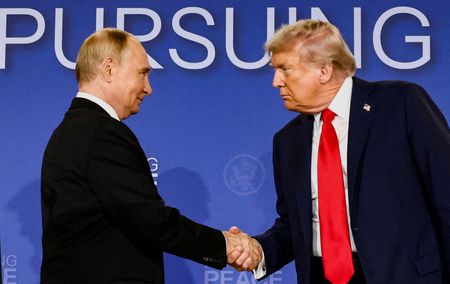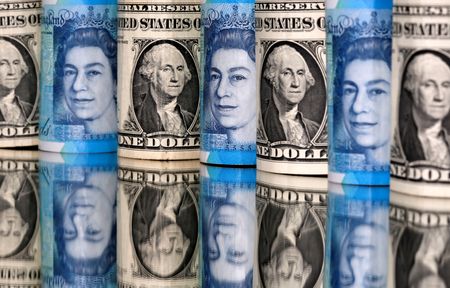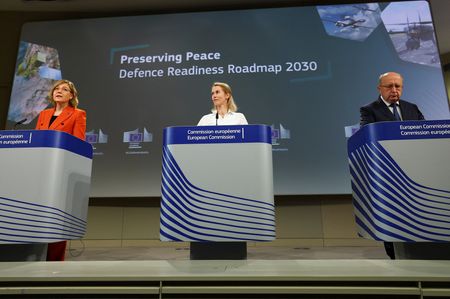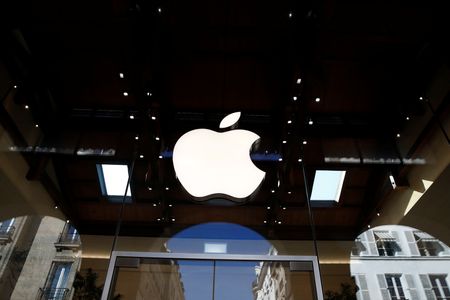By Trevor Hunnicutt
WASHINGTON (Reuters) -U.S. President Donald Trump said he and Russian President Vladimir Putin agreed on Thursday to another summit to discuss ending the war in Ukraine, one day before the U.S. president was due to speak with Ukrainian leader Volodymyr Zelenskiy.
Trump said he and Putin would soon meet in Budapest after a more than two-hour phone call Trump described as productive. The Kremlin confirmed plans for such a meeting. No date was provided.
The surprise development came as Zelenskiy was headed to the White House on Friday to push for more military support, including potential long-range offensive missiles.
Yet Trump’s conciliatory tone following the Russia call appeared to leave in question the possibility of such support in the near term and raised European fears of U.S. capitulation to Moscow.
PUTIN WARNS TRUMP ABOUT SUPPLYING MISSILES
During the call, Putin told Trump that supplying such missiles to Ukraine would harm the peace process and damage U.S.-Russia ties, Kremlin aide Yuri Ushakov told reporters.
Ukraine’s embassy in Washington did not immediately respond to a request for comment.
The meeting location has drawn attention. Putin is wanted for alleged war crimes in some jurisdictions, restricting his travel.
Ukraine’s relationship with Hungary has grown increasingly tense. Zelenskiy accused Hungarian drones of crossing into Ukraine last month, prompting Hungarian Prime Minister Viktor Orban to retort that Ukraine was not an independent sovereign state.
In contrast to most NATO and European Union leaders, Orban has maintained cordial relations with Russia while questioning the logic of Western military aid for Kyiv, a stance that has frequently put him at odds with Zelenskiy.
“The planned meeting between the American and Russian presidents is great news for the peace-loving people of the world,” Orban said on X. “We are ready!”
The Trump-Putin meeting will follow lower-level talks between Moscow and Washington next week, including U.S. Secretary of State Marco Rubio at a location to be determined, Trump said. The Kremlin said Russian Foreign Minister Sergei Lavrov would take part.
In a post on Truth Social, Trump said he would brief Zelenskiy on the Russia talks in the Oval Office on Friday.
“I believe great progress was made with today’s telephone conversation,” he added.
UKRAINE WANTS TO EXPAND ATTACK RANGE
Kyiv and Moscow have been escalating their war with massive attacks on energy infrastructure while NATO struggles to respond to a spate of Russian air incursions.
Ukraine has been seeking U.S. Tomahawk long-range missiles, which would put Moscow and other major Russian cities within range of missile fire from Ukraine.
Trump, a Republican who has vowed to end the war that Russia started with its invasion of Ukraine in 2022, had before Thursday expressed increasing frustration with Putin over ongoing attacks.
Trump has said he could supply the long-range weapons to Ukraine if Putin fails to come to the negotiating table.
In its latest barrage, Russia launched more than 300 drones and 37 missiles to target infrastructure across Ukraine in overnight attacks on Thursday, Zelenskiy said. Kyiv has ramped up its own attacks on Russian targets, including an oil refinery in the Saratov region on Thursday.
Russia has been hitting Ukraine’s energy and power facilities for consecutive winters as the war drags into its fourth year.
In the latest warnings to Russia, Trump said on Wednesday that Indian Prime Minister Narendra Modi had pledged to stop buying oil from Russia, and that the administration would push China to do the same. India has not confirmed any such commitment.
Defense Secretary Pete Hegseth said on Wednesday that Washington would “impose costs on Russia for its continued aggression” unless the war ends.
(Reporting by Trevor Hunnicutt; Additional reporting by Bhargav Acharya in Toronto, Anita Komuves in Budapest and Anastasia Lyrchikova in Moscow; Editing by Doina Chiacu, Colleen Jenkins and Rod Nickel)










